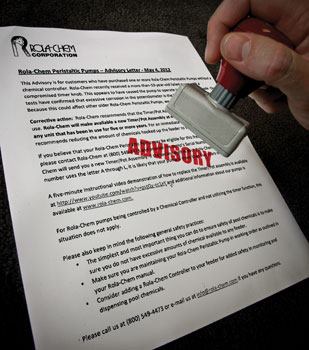Though Rola-Chem Corp. issued an advisory regarding certain models of its peristaltic pump chemical feeders, the company does not claim liability in a recent lawsuit and said its product is not defective.
However, at least some professionals remain concerned.
In 2008, two people received second-degree burns after using a spa in a condominium complex. It was claimed that the chemical feeder, produced by Rola-Chem, had been operating in the “on” position, thereby dumping a large amount of chlorine into the small body of water. A service technician also named in the lawsuit said he had put the feeder in “timer” mode so the unit would periodically inject a set dosage into the water. He alleged that a defect must have caused it to change modes.
The case was settled, and Rola-Chem never made an admission of liability. But some continued to believe there is a defect with the product. The service firm’s attorney said he’d heard anecdotal evidence of several such failures, while the insurance carrier reported hearing of another similar incident, though it did not escalate into a claim.
Last month, the St. Paul, Minn.-based manufacturer issued an advisory letter stating the company had received a unit that was more than 10 years old, with a compromised timer knob that caused the feeder to operate in a continuous mode. The producer determined the problem stemmed from excessive corrosion in the potentiometer.
Rola-Chem recommended that the timer/pot assemblies be switched when a product reaches five years of age, unless it is managed by a chemical controller.
Professionals can receive free replacements by calling the manufacturer.
In the meantime, the letter continued, applicable feeders should be set to dose the minimum necessary amount of chemical. Hooking the feeder up to a controller also would solve the problem, a company representative said.
But one industry professional who has been following this situation since the lawsuit disagrees with the manufacturer’s handling of the issue. “I think their advisory falls far short … ,” said Raymond Arouesty, president of Arrow Insurance Service in Simi Valley, Calif., which covered the service technician involved in the litigation. “The public is at risk for serious injury when one of these feeders continues to run in the ‘on’ position.
“I am deeply troubled that the manufacturer, rather than recalling the product, wants pool service techs to replace the switches, the age of which might not be readily known,” he said. “I’m concerned that they’re attempting to shift the responsibility for this issue to the service tech.”
But the advisory does not prove that there’s a pattern of failures in the field, or that there is a product defect, said Mark Lynch, Rola-Chem’s national sales manager. “Something that’s been in the field for 10 years isn’t a defective product — it’s just sort of a worn-out product,” he added.
But the finding was an indirect result of the lawsuit. Arouesty worried that other cases may arise, so he encouraged service technicians to send failed Rola-Chem units to the producer. The manufacturer has reported receiving approximately a half-dozen units.
“When we tested them, we learned that the corrosion in the potentiometer would send a mixed signal to the timer, and it would not perform in the timer mode,” Lynch said. The timers themselves had not failed, he added. Though all the examined models were at least 10 years old, the company chose to apply the advisory to anything over five years to allow a window of time for repairs, Lynch said.
Rola-Chem is currently improving the potentiometers on future feeders, but officials expect a few months to pass before they can find a new supplier and receive approval from third-party testing laboratories.
In addition to safety and liability, Arouesty raised the issue of cost. “They’re giving away a free switch,” he said. “Who’s supposed to pay for the burden of the service tech’s time? This is not an issue that was caused by the service tech.”



